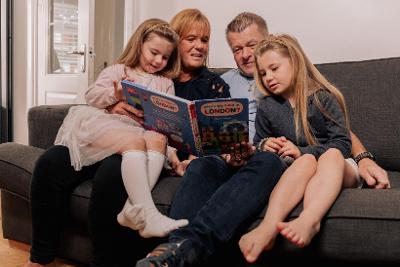Lesley and Anth's story
As the innovative Mockingbird fostering model is introduced in all local authority partners of Foster with North East, we spoke to hub carer Lesley to bring you real-life insight into the scheme which has been pioneered by The Fostering Network.

Lesley shared with us what it's like to be a Mockingbird hub carer and how Mockingbird constellations are helping regional fostering families to thrive. Read on to discover why Lesley thinks Mockingbird is exactly what fostering has been missing.

"They wouldn't want someone like me" - the start of Lesley's fostering story.
"We've done every kind of fostering you can think of," says Lesley, who has been fostering with her husband Anth for almost a decade, alongside her job working for a council.
"We've had siblings, we've had twins, and we've looked after a different variety of age groups. We've done short breaks, and emergency stays. We've got children living with us in permanent fostering, and we've moved children on to adoption as well."
And yet, when Lesley first told one of her colleagues that she'd love to try fostering, and they said she'd be perfect for the role, she somehow doubted she would be a fit. "They wouldn't want someone like me," she said.
Encouraged by her colleague, Lesley did go on to apply, and she and Anth have looked after dozens of children and young people, many of whom stay in touch with the couple. A few years ago, they were approached to share their experience and help other foster carers by becoming the first Mockingbird hub carers in Sunderland.
What it's like being a hub carer in a Mockingbird constellation

"Until you run a hub or you're in a constellation, you don't realise it is what you've been missing for a long time."
You don't need to be older than the other foster carers in a constellation to be a hub carer, but they do adopt a guiding role.
Lesley explains: "We are classed as the Nana and Grandad of the family. We are probably just about old enough to be Nana and Grandad to some of them.
Mockingbird constellations are made up of six to ten families with their children. The number of cared for children can't exceed 20, and the constellation is based on this number. As hub carers we will support the members with anything from telephone calls to childcare to overnight stays. We also do a child's activity once a month. Then we do an adult activity once a month, usually training or support and a get-together. We'll do something like set up a big breakfast, bacon sandwiches, that type of thing.
"As the hub carer, you build the whole network up. The activities are what you would do with a normal typical family. All the constellations are like all the aunties and uncles of a family. I look after everybody, but if I'm unavailable to provide an overnight stay, one of the other carers could also provide support or overnight stays. So it's not that they can only call on me and Anth; children can go to one of the other foster carers and get that support and help as well. I'm like the glue that keeps us all stuck together."
Get your foster care information pack
How the Mockingbird model works like an extended family
Lesley tells us how shared experiences bring the different families within the constellation closer together, building relationships and confidence.

"A lot of children bring trauma with them. Sometimes, it can be difficult for them to take part in what we perceive as a normal day out because they struggle with that. It helps having people around them who understand that. What we'll do is, we get them together and we support them in building relationships until they feel confident."
Lesley remembers a constellation barbecue held at her house, which, for one young girl, was her first experience of a 'family' gathering because her previous family life didn't involve going out or going on trips.
"It just benefits everyone so much because it becomes normal. It becomes a family," Lesley says.
The extended family model of Mockingbird also gives carers and children space and support when it's most needed.
Lesley says: "I see foster carers with better relationships with the children because it never reaches that crisis mode when things are tough. I'll always come along to try and intervene in one way or another to support them. I actually think this has really help with the stability for lots of children."
How Mockingbird helps young people

"We've got one young boy, who when we started Mockingbird, he couldn't even come through the front door of the house. Two and a half years later, he comes to sleepovers. We've got a brilliant relationship. He knows where he's staying and his room and everything else, so it really works for him."
Lesley also explains how she's seen Mockingbird help older children by giving them other trusted adults they can rely on.
There's one young man who always comes to mind as someone who has benefited so much from it, who's now 17. The first night he ever met me, he was having a tough time; he was in crisis mode. I went over to his house to help his carer calm him down and support the carer. It was not going to be possible for him to stay with his carer, so we brought him back to our house, and from that day, he just took a totally different turn in life.
He started from a point where he was struggling, with emotions, with relationships, with friends, with his carers, and we built on that. Now, if and when he's having a tough time, he doesn't just take off; he doesn't just run away or take it out on his carer. He just rings us and asks, can I come over for a few days. For him, this is just a normal family. I'm like his auntie.
You may never feel 'ready', but the fostering community is here to help
As we end our chat, we ask Lesley if she has any advice for someone thinking about fostering. She says, "It's challenging, but with the support and the help, you will learn how to parent these children and help them flourish. We all learn every day. We teach them in a different way to start and take pride in themselves. They start to see the benefit they bring to the world, and that is really what makes everything worthwhile."
Find out more
If you think you could share your home to shape the future of children in the North East we'd love to hear from you. Complete our no-obligation enquiry form and one of our Foster with North East team will be in touch to answer any questions you may have, and talk you through the application process.




